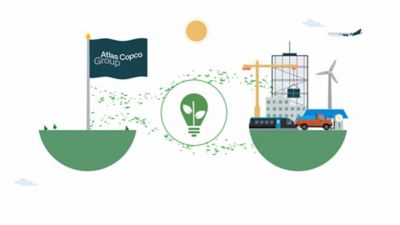Leave nothing to waste
June 2, 2015
Atlas Copco filtration solutions help FCC turn Nottingham’s waste into energy.
Waste-generated steam supplies electricity to many homes and businesses in the area, such as the National Ice Centre.
FCC Environment, one of the UK’s leading recycling and waste management companies, is using the latest energy-efficient compressor and filtration solutions from Atlas Copco to help turn waste into energy at its Nottingham waste processing site.
The energy from the company’s facility produces heat and steam to generate power without using fossil fuels. Since the facility opened 39 years ago, it has reduced the amount of waste going to landfill sites by 5 million tonnes.
At FCC’s facility air quality is extremely important, since any contaminants in the air supply would affect the instrumentation that is vital to flue gas monitoring and risk non-compliance with the company’s Environmental licence stipulations.
This requirement for high quality standards is the principal reason FCC turned to Atlas Copco to meet its compressed air needs. Equipment installed at the site includes two screw compressors − one fixed speed and the other a VSD machine, capable of matching output to user demand for optimum energy savings. The system was augmented with three vertical air receivers, and to ensure first class dry air at the point of use, three BD desiccant dryers with a guaranteed dew point of -70 degrees C. These were then fitted and connected to Atlas Copco’s latest particulate and coalescent filters. Environmental protection was also ensured with the installation’s EWD condensate management system that prevents any possible drainage contamination.
FCC was one of the first compressor customers to have Atlas Copco’s new filter range units installed. The design of these innovative filters ensures a pressure drop of only half of that associated with conventional coalescing or particulate filters. This translates into significant energy savings.
“When we sat down to discuss potential requirements, life cycle costs and energy efficiency was at the forefront of everyone’s mind,” says Alan Burkill, Atlas Copco Compressor Technique Service Sales Engineer. “Our proposal was a solution that delivered the lowest life cycle cost to our customer and energy-efficient filtration was an integral and indispensable part of the installation.”
FCC’S Eastcroft plant generates steam used by many public buildings in Nottingham, such as the National Ice Centre. In addition, it keeps 5 000 families warm while keeping the climate a little cooler. Atlas Copco was seen to be on the same page in an endeavor to make sure that no energy is wasted. “I have known Atlas Copco for over 23 years and have always had a good quality service from them in all respects,” says Philip Eyre, FCC Environment’s Maintenance Manager. “The quality of their products definitely fits with what FCC requires in this facility.”
“I have known Atlas Copco for over 23 years and have always had a good quality service from them.” Philip Eyre, FCC Environment Maintenance Manager.




